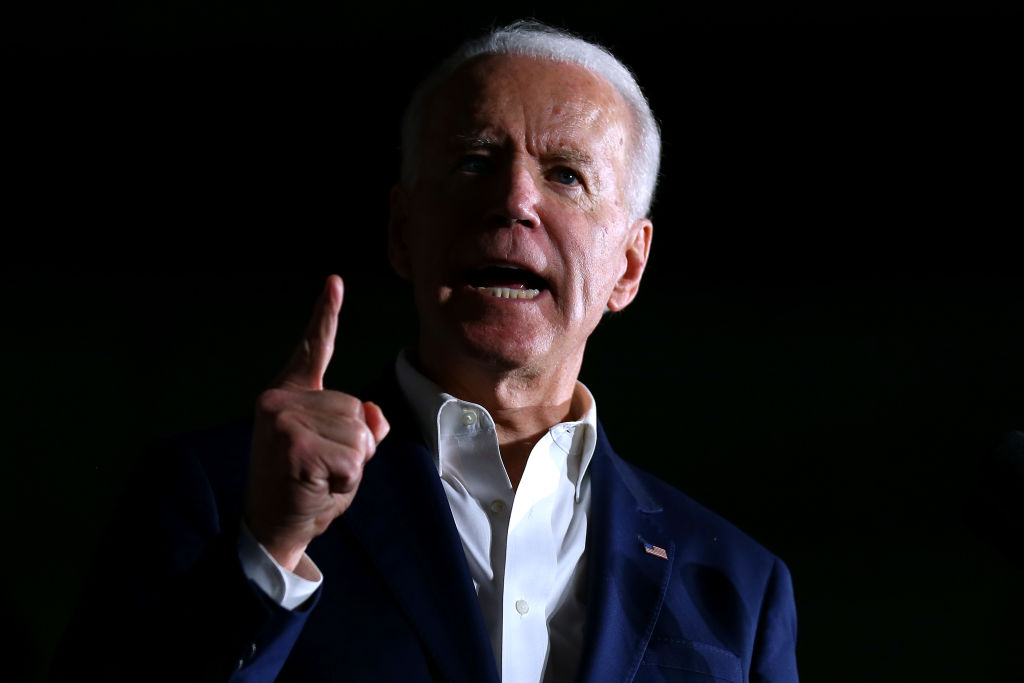The Heat 2020
The Climate-Driven Voter’s Joe Biden Dilemma
Bernie Sanders was environmentalists’ first choice for president; Elizabeth Warren their second. But Biden is now their only hope.

It happened on February 19, 2020, during the penultimate Democratic presidential debate before the die was cast: Former Vice President Joe Biden, anxiously aware that what was once a crowded field would soon narrow to a two-man race, made an abrupt pivot off a question about oil and gas CEOs. Biden had promised to “hold them accountable” for climate change, moderator Vanessa Hauc reminded him. So what would he do? Fine them? Sue them? Throw them in jail?
 This story is a part of Covering Climate Now’s week of coverage focused on Climate Solutions, to mark the 50th anniversary of Earth Day. Covering Climate Now is a global journalism collaboration committed to strengthening coverage of the climate story.
This story is a part of Covering Climate Now’s week of coverage focused on Climate Solutions, to mark the 50th anniversary of Earth Day. Covering Climate Now is a global journalism collaboration committed to strengthening coverage of the climate story.
“I think that any executive who is engaged,” he began, then veered off: “By the way, minority communities are the communities that are being most badly hurt by the way we deal with climate change. They are the ones that become victims! That’s where the asthma is, that’s where the groundwater supply has been polluted.”
Azalea Danes was watching that night, rooting for one of her favorites, Vermont Sen. Bernie Sanders or Massachusetts Sen. Elizabeth Warren. But Biden pulled her up short.
“He was talking about environmental justice,” she remembers. “I didn’t even know he knew what that meant. My jaw just dropped.”
Climate Activist: “Because climate is my number-one issue, to not vote for Joe Biden would be senseless.”
Danes, 17, lives in New York City, where she serves as communications director for TREEage, a local organization that advocates for climate candidates. She also handles communication for Extinction Rebellion Youth US, a stateside manifestation of the international climate group. For the last few weeks, she has been “working tirelessly” to adapt a 72-hour strike planned to start on April 22, Earth Day’s half centennial, into a stay-at-home compliant “livestream mobilization” featuring Alexandria Ocasio-Cortez, Bill McKibben, and “just about every climate activist you can think of,” she says.
She is not thrilled that she will cast the first vote of her life in November for a man who has made peace with segregationists and touched women in ways that have made them cringe, or, allegedly, even worse. But she will do it.
“For me, personally, because climate is my number-one issue, to not vote for Joe Biden would be senseless.”
* * *
Ever since Sanders ended his campaign for president and endorsed Biden, climate activists have had to sit with the uncomfortable reality that the candidate they liked the least in the Democratic primary is now their only hope for challenging Trump in November. Biden earned poor marks from almost every organization on climate policy: The youth-led Sunrise Movement gave him 75 out of a possible 200 points (Sanders scored 183; Warren 171). The Center for Biological Diversity Action Fund scorecard granted Biden only two points compared with Sanders’ perfect 10.
It’s not going to be enough to rejoin the Paris climate agreement and aim for a zero-carbon future by 2050.
Biden’s weak climate policy might have had less to do with ideology than a basic lack of resources, says Brett Hartl, the CBD Action Fund’s director of government affairs. “He really didn’t have a ton of people on his campaign. He didn’t raise as much money, his policy staff was smaller, he didn’t have the ability to really work on plans the way Elizabeth Warren did.” Since he became the presumptive nominee, Biden has been meeting with his rivals and shown a willingness to merge his policies with theirs. “For now,” Hartl says, “I’m going to reserve judgment.”
That said, Hartl and others who see doom lurking in our carbon-choked future say Biden has to get his climate game together – not just to lure the Sanders-and-Warren left into his camp, but if he ever hopes to make a difference to the planet, should he win. It’s not going to be enough to rejoin the Paris climate agreement and aim for a zero-carbon future by 2050. “Paris is a day-one given, but not really that impressive,” Hartl says. “And if you don’t say there has to be a 50-percent reduction by 2030, you’re not setting yourself up for the strong actions that we need.”
Climate voters have been waiting a long time for an election to hinge on the existential threat that is global warming.
To that end, Biden shouldn’t shrink from pitching big expensive plans, for fear of being branded a “tax-and-spend liberal.” Whether it’s declaring a National Climate Emergency on day one or rolling out an ambitious Green New Deal, fixing the climate is going to cost a lot of money, and the COVID-19 response has proved that we can marshal such funds when disaster strikes. And in climatic terms, disaster is close at hand.
Biden’s website promises a $1.7 trillion investment for climate and environmental justice over the next 10 years. But what if that’s not enough? “What if it takes a $5 trillion [federal investment] to save the planet?” Hartl wonders. “So — what? You’re not going to do it?”
Nor does Biden have the luxury of vacillating this election season: He’s got to decide what his policy is, and stick to it, says Ivy Jaguzny, 17, who for the last three years has worked with the Seattle-based group Zero Hour. To her, Biden “at least presents an opportunity for people on the left to pressure the Democratic Party” for stronger climate policies. But she has doubts about Biden’s commitment. “What’s important to Bernie supporters is results,” she says. “Just because [Biden] says he backs Bernie’s plans, it doesn’t mean he will follow through.”
Finally, go ahead — alienate the pro-oil centrists. They weren’t going to vote for you anyway. “The Biden people have to think about what’s the bigger risk,” Hartl says. “Is it having people not be excited about voting and not having a high turnout because the progressives are just kind of like, ‘meh’? Or is it failing to win over the voters that think, ‘Yeah, I would vote Democratic except for, you know, drilling, drilling, drilling!’ I find it hard to believe those people exist.”
Climate voters, meanwhile, have been waiting a long time for an election to hinge on the existential threat that is global warming. And there are more of them than ever before.
“What would really seal the deal for me is if he shows us he is sincerely committed to breaking ties with the fossil fuel industry,” Jaguzny says. “If we continue to let those companies control everything in our government, we can’t make any progress at all.”
Copyright 2020 Capital & Main

-

 Column - State of InequalityJanuary 29, 2026
Column - State of InequalityJanuary 29, 2026Are California’s Billionaires Crying Wolf?
-

 Latest NewsFebruary 3, 2026
Latest NewsFebruary 3, 2026Amid the Violent Minnesota Raids, ICE Arrests Over 100 Refugees, Ships Many to Texas
-

 Dirty MoneyJanuary 30, 2026
Dirty MoneyJanuary 30, 2026Amid Climate Crisis, Insurers’ Increased Use of AI Raises Concern For Policyholders
-

 Featured VideoFebruary 4, 2026
Featured VideoFebruary 4, 2026Protesters Turn to Economic Disruption to Fight ICE
-

 The SlickFebruary 2, 2026
The SlickFebruary 2, 2026Colorado May Ask Big Oil to Leave Millions of Dollars in the Ground
-

 Column - State of InequalityFebruary 5, 2026
Column - State of InequalityFebruary 5, 2026Lawsuits Push Back on Trump’s Attack on Child Care
-

 Column - California UncoveredFebruary 6, 2026
Column - California UncoveredFebruary 6, 2026What It’s Like On the Front Line as Health Care Cuts Start to Hit
-

 The SlickFebruary 10, 2026
The SlickFebruary 10, 2026New Mexico Again Debates Greenhouse Gas Reductions as Snow Melts

